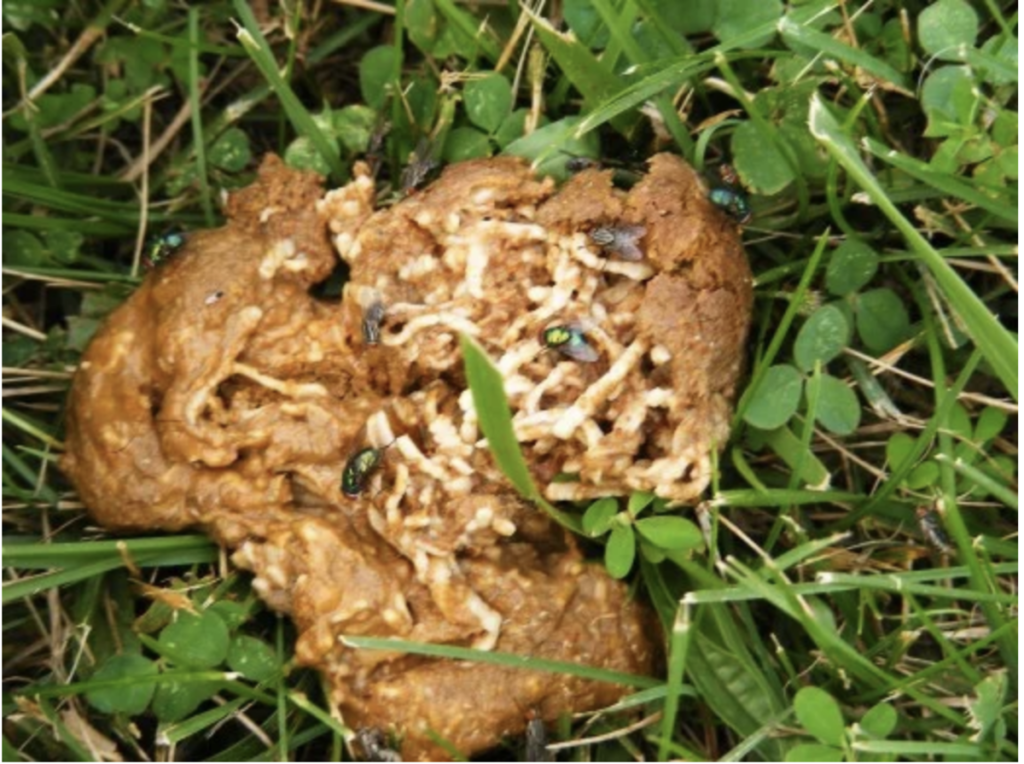It’s never pleasant to think about worms in our dogs; Worms in Dogs. Nobody wants to imagine the little creepy crawlies infesting their dog’s internal organs. Serious health problems can occur if these in dogs are left untreated, which is why it’s important to know the signs of worm infestation. These can be picked up from contaminated soil or your dog stool and they can infect other dogs.
Worms in dogs are relatively common. They can infect adult dogs and nursing puppies. Children or people who are immune-suppressed are the most susceptible to these and may be transferred to them by dogs.

Dogs that inhale or ingest contaminated soil or feces, or become infected by parasites through grooming and licking another animal can get these. The type of parasite will determine where the infection is in the body and what symptoms appear; for example, heartworms could cause heart disease and intestinal parasites could result in vomiting and diarrhea.
Dog owners should be aware of the five main types of these that affect dogs: roundworms, tapeworms, hookworms, whipworms, and heartworms. These are some common symptoms to look out for in case your dog has an infection. Make an inquiry about what you need to know to keep your dog healthy.
Health issues that can arise from this parasite-infested dog include diarrhea, abdominal pain, weight loss, vomiting, poor coat appearance, pot-bellied appearance, lethargy, and dehydration. In addition to these symptoms being uncomfortable for your dog to experience, they can be life-threatening as well. Others are nutrition deficiency, anemia, blood in stool, and pneumonia.
Table of Contents
Types of Worms in Dogs
- Roundworm
Many puppies are born with roundworms, which they pick up from their mothers. Puppies should receive veterinary care to prevent infection with roundworms. Roundworm eggs can be found in a fecal sample and treated with deworming medication. Dogs may become infected by ingesting eggs of the roundworm or hosting an infected animal such as rodents, rabbits, etc. They are some of the common intestinal parasites in dogs. Diagnosing infections in dogs is important. Promptly detecting and treating these infections can prevent serious complications.

- Tapeworm
Tapeworm is a type of intestinal parasite that dogs can acquire by eating infected fleas or by consuming wild animals infested with tapeworms and fleas; Worms in Dogs. A dog becomes infected when it eats the flea; the tapeworm egg hatches and attaches to the dog’s intestinal lining. The infected dog may pass segments of the tapeworm in their stool. Treating your dog is easy because oral medications are available over the counter at any pharmacy.
- Hookworm
Hookworm is an intestinal parasite that lives within the host and can cause the loss of blood in dogs; Worms in Dogs. Several kinds of them affect dogs, and they are very small but do large amounts of blood when they attach to the dog’s intestines. A dog may eat infected dirt or lick it off its paws, or sniff infected dog feces. Humans can become infected by eating uncooked meat from animals. Dogs are treated with deworming medications. Usually, they are given the first dose to catch the adult parasites and then a few weeks later to catch those that are new.
- Heartworm
Heartworm is a serious threat to dogs; Worms in Dogs, and they can be transmitted by mosquitoes. Because it is nearly impossible to avoid mosquitoes in most places, vets recommend heartworm preventatives to keep your dog safe. Heartworms grow within the heart, causing severe lung disease, heart failure, and other organ damage that can eventually lead to death if left untreated. Prevention is the best approach to heartworm disease because treatment can be very expensive and harmful to a dog. Treating the disease requires confinement and exercise restrictions, which could be difficult for a pet owner.
- Whipworm
Dogs get whipworm from eating something infested with them; Worms in Dogs. The eggs can live for up to five years in a suitable environment, and many dogs don’t show any symptoms. In severe cases, the parasite may cause inflammation, diarrhea, weight loss, or anemia.

Diagnosis
There are several types of worms that can infect dogs; Worms in Dogs. If you notice that your dog is exhibiting any symptoms, intestinal parasites must usually be diagnosed by looking for eggs via the microscopic examination of a stool sample. Heartworms can usually be detected by a blood test. Tapeworms can be seen in the dog’s stool.
Prevention
To prevent Worms in Dogs, you should take regular testing to test for different types of parasites. Flea control, hygiene, and prevention are the best methods to keep your dog parasite-free. Your vet can also recommend de-worming medications to treat different types of intestinal parasites and heartworms as well as preventative medications.




